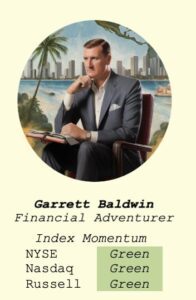I took many questions from yesterday's piece on global liquidity. That's good.
It means that people are thinking. They're questioning. They're challenging the status quo but also the author.
That's how it should be. The markets don't care about valuations right now. Earnings reports are coming in, and regional banking stocks are getting stronger - another testament to the power of insider buying from March and April.
What about the Fed's rate hike on Wednesday? Who cares…
The markets recognize that fiscal conditions are expanding; there's plenty of money sloshing around these markets, and that's going to have implications for every investor.
I think the most interesting take on what's coming next is from former Dallas Fed president Robert Kaplan. I caught him this morning on CNBC's Squawk Box, and I actually like what I heard.
If you're familiar with my history there, you know that says a lot…
Because You Missed Squawk Box
During the pandemic, I ran a short-lived blog called Because You Missed Squawk Box. Each morning, I'd watch the show until I couldn't anymore. At most, I'd make it about 14 minutes and record the exact moment the show went off the rails.
So, I was surprised to see an intelligent interview this morning with Robert Kaplan.
Kaplan resigned in 2021 because he allegedly traded while the central bank expanded its balance sheet.
(Hey - who says Open Market Operations can't drive asset prices higher? I mean, the central bankers themselves were buying with their own money when the Fed was buying assets.)
This morning, Kaplan offered a few eye-opening admissions on the U.S. economy and the markets.
First – core inflation readings are still too high.
The reason has nothing to do with the Federal Reserve.
Kaplan argues that the government spending on the Inflation Reduction Act and the infrastructure law is still cycling through the system. It's a lot of money, and it's increasing demand for goods, services, and workers.
Kaplan thinks the Fed would be done with its rate hikes if not for those two massive spending programs. However, inflation is likely to remain sticky due to this fiscal effort.
There are still several hundred billion dollars in unspent money coming down the pipeline on projects. Kaplan notes the money will eventually run out… but not this year… and maybe not even next year. The fiscal taps remain set on "Firehose" mode.
That said – he thinks that when the money dries up, we'll see a real problem in the market and another leg down. That would force the Fed to pivot and change its course.
Dare I say it? Sure, I will: The Fed would then be likely to expand its balance sheet.
Fix the Damn Problem – Curbing Inflation Isn't Hard
I've noted three primary ways to tackle inflation: monetary policy, fiscal policy, and supply-side policy.
Unfortunately, we've only had the Federal Reserve using the blunt force of interest rate hikes – and even then, it's a massive challenge. Congress is running trillion-dollar deficits, and the cost of regulation is costing the average American family more than $5,000 a year since 2021.
So, what's the solution to curbing inflation for good?
Kaplan proposed a "whole government" approach to tackling inflation. That would require two other remediation strategies that haven't even been considered.
The first: cut spending. The United States has tripled its budget deficit over the past year, and we're on a runaway path toward $50 trillion in debt. We could reduce government spending and bring it more in line with the amount of tax revenue that Uncle Sam collects. Don't spend more than you make! What a concept!
The second is on the supply side.
Kaplan doesn't use the term "supply side" because economists are allergic to it. It invokes Ronald Reagan, and we can't have that. Kaplan even admitted that proposing such regulatory changes is "heresy" today.
So, he calls these mitigations "structural." They include reducing red tape in government, boosting U.S. oil and gas production, and fixing the broken immigration system to streamline the hiring and training of more workers.
These, at least, are outside the Fed's mandate, and Kaplan admits as much. He calls for a "broad approach" instead of just using the hammer of interest rate hikes that can (and will) break something major if this pace continues.
<Gasp!> Someone is making sense.
I'm stunned that Elizabeth Warren didn't burst out from behind the studio camera and chase Kaplan out the window for such heresy against the cult of Modern Monetary Theory (MMT).
Right now, investors need to keep their focus on the long term.
Don't start dumping stocks if you're a value and income investor. If you're investing for the long haul, your goal should be to generate strong cash flow, push yourself past the 12-month hold period for tax purposes, and use long-dated puts for hedging to carry you over that tax threshold finish line.
All these strategies will be part of our ongoing moneymaking approach here as Republic Research launches in the fall.
Stay alert,
 Garrett Baldwin
Garrett Baldwin
Florida Republic Capital
About the Author
Garrett Baldwin is a globally recognized research economist, financial writer, consultant, and political risk analyst with decades of trading experience and degrees in economics, cybersecurity, and business from Johns Hopkins, Purdue, Indiana University, and Northwestern.



